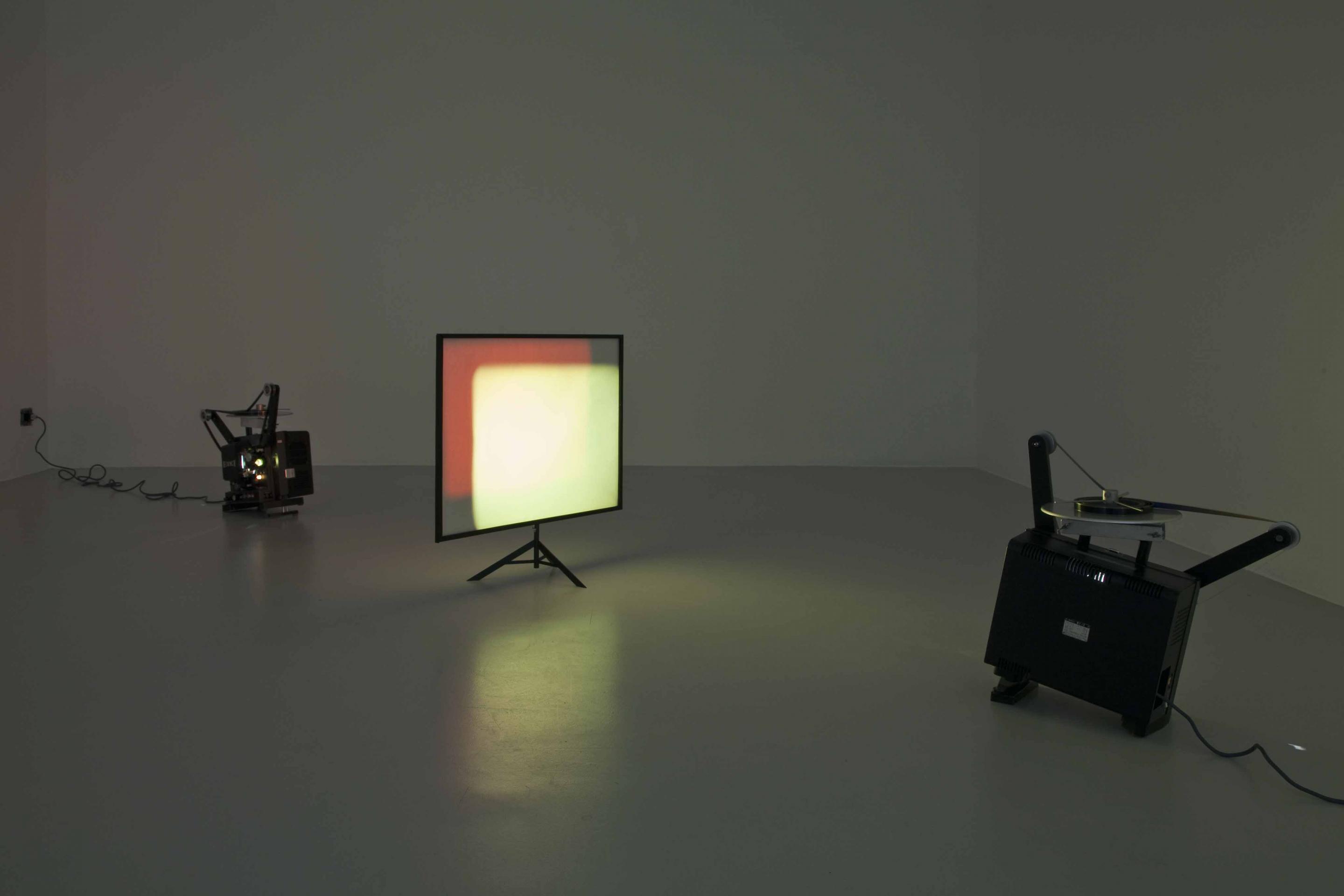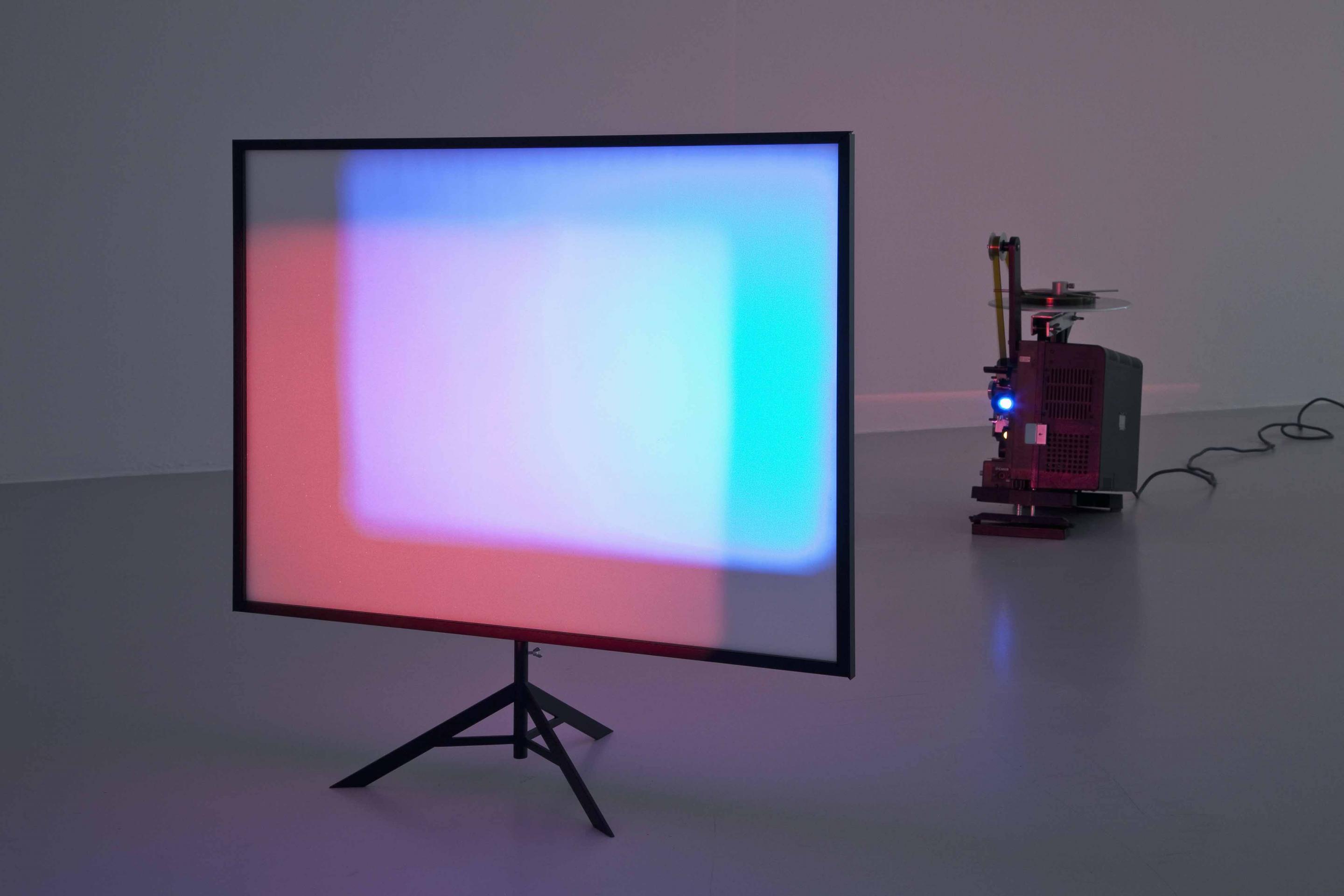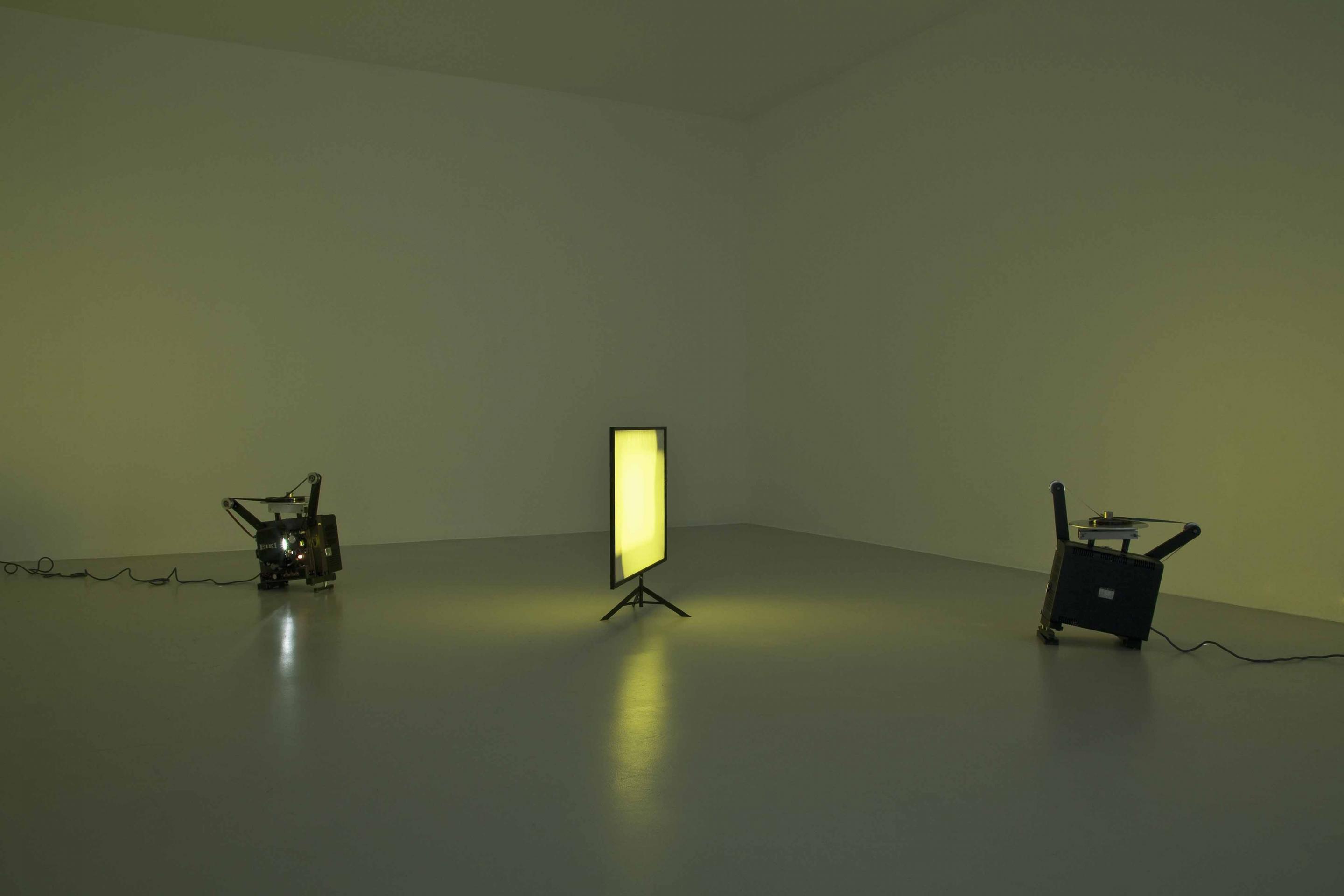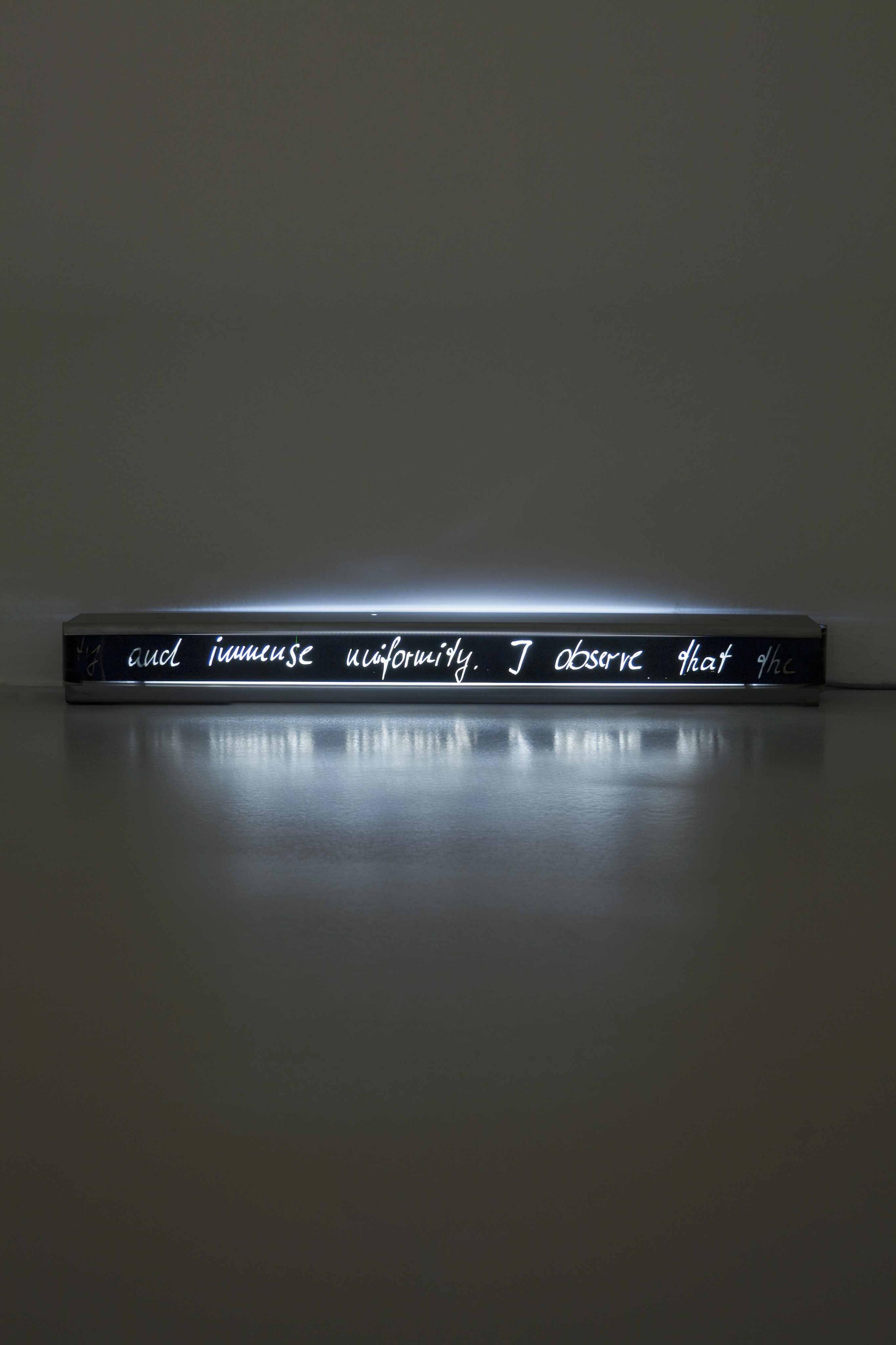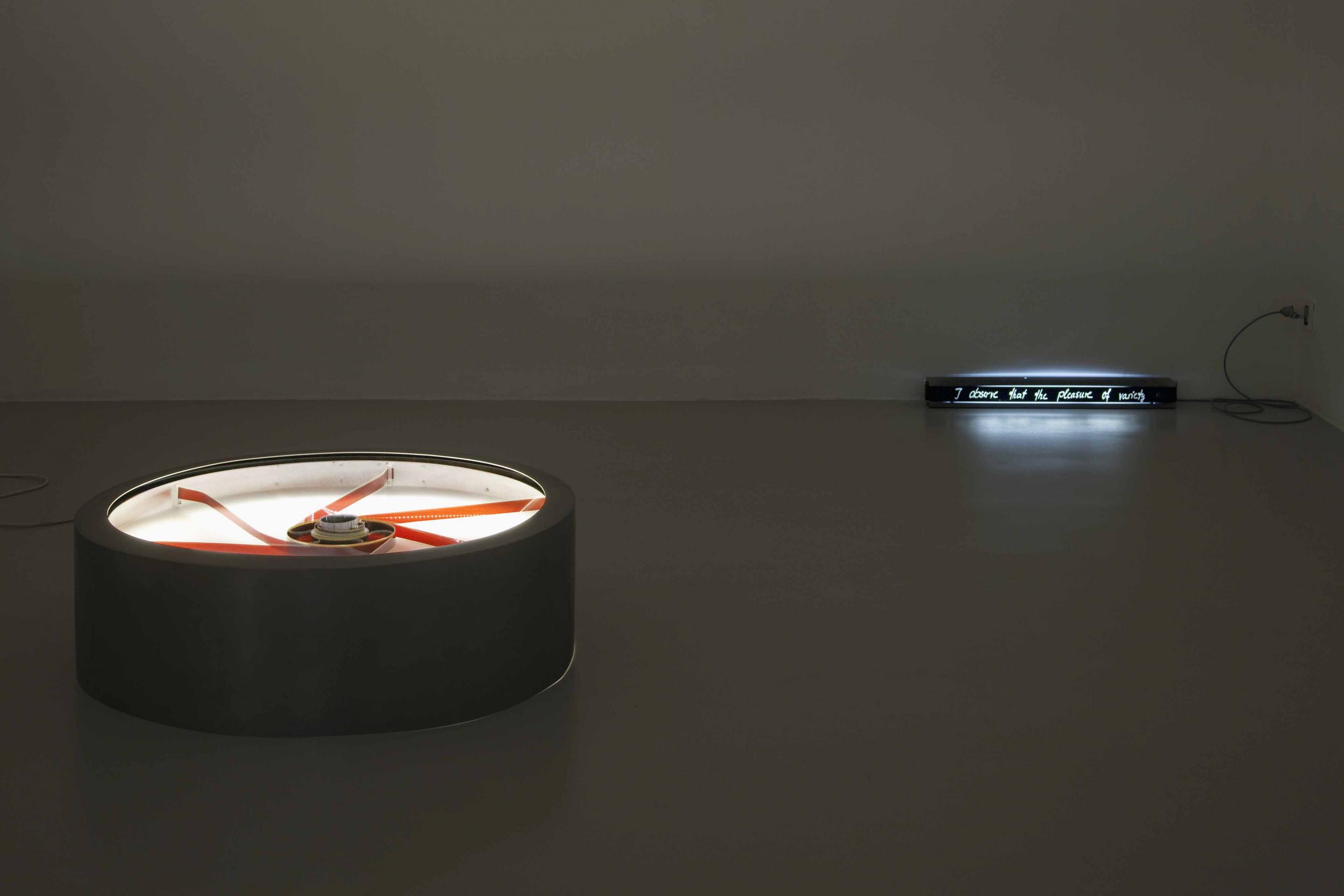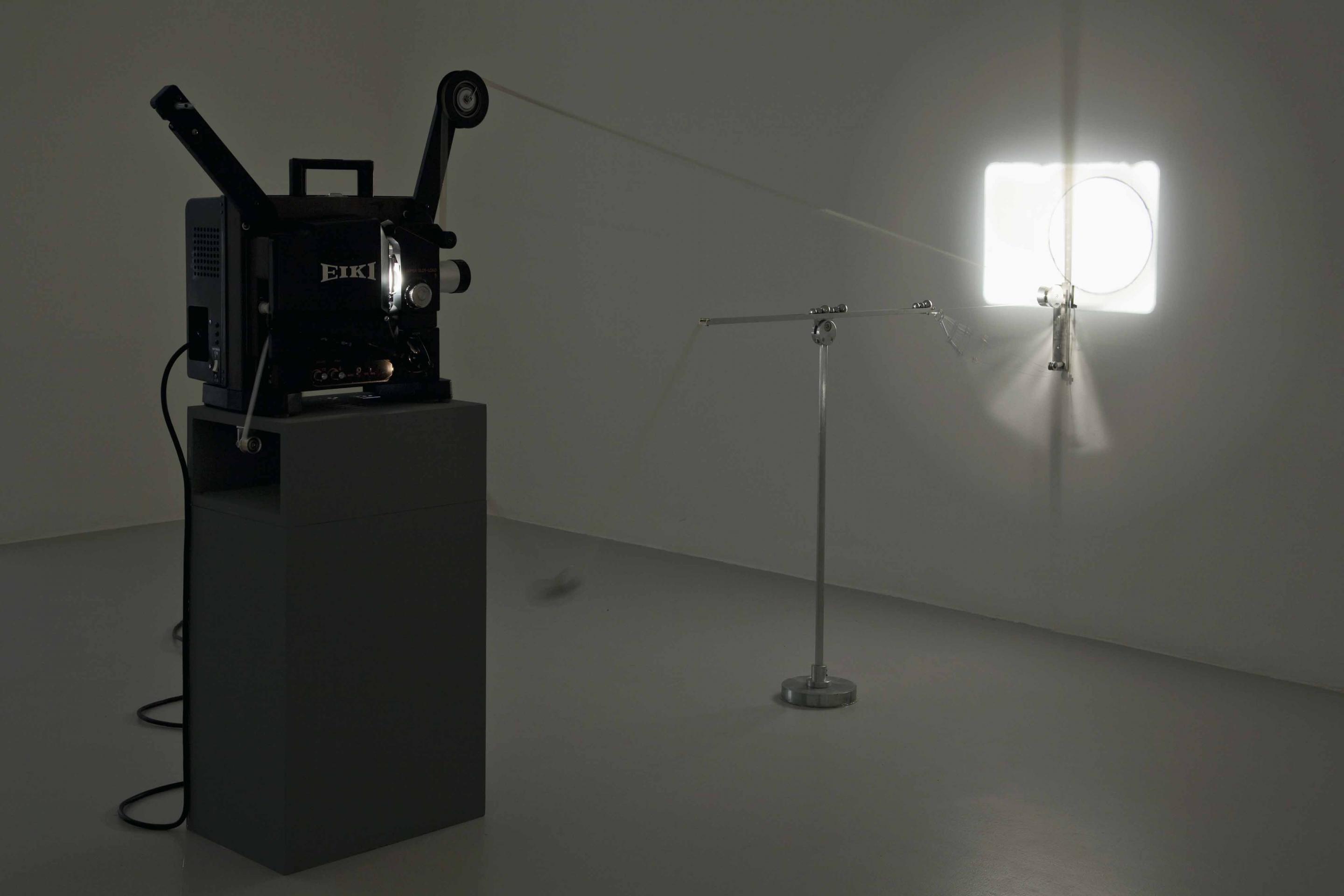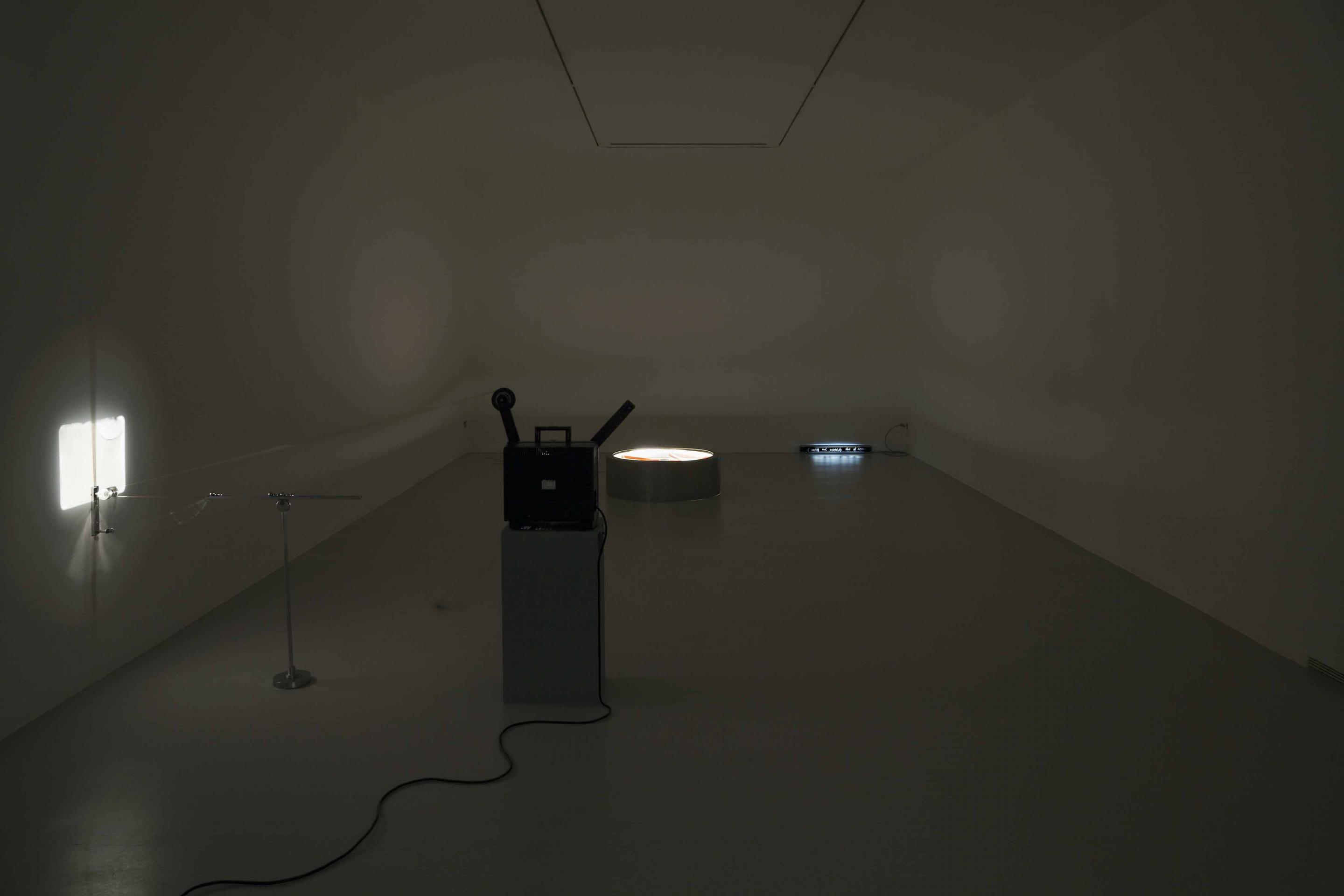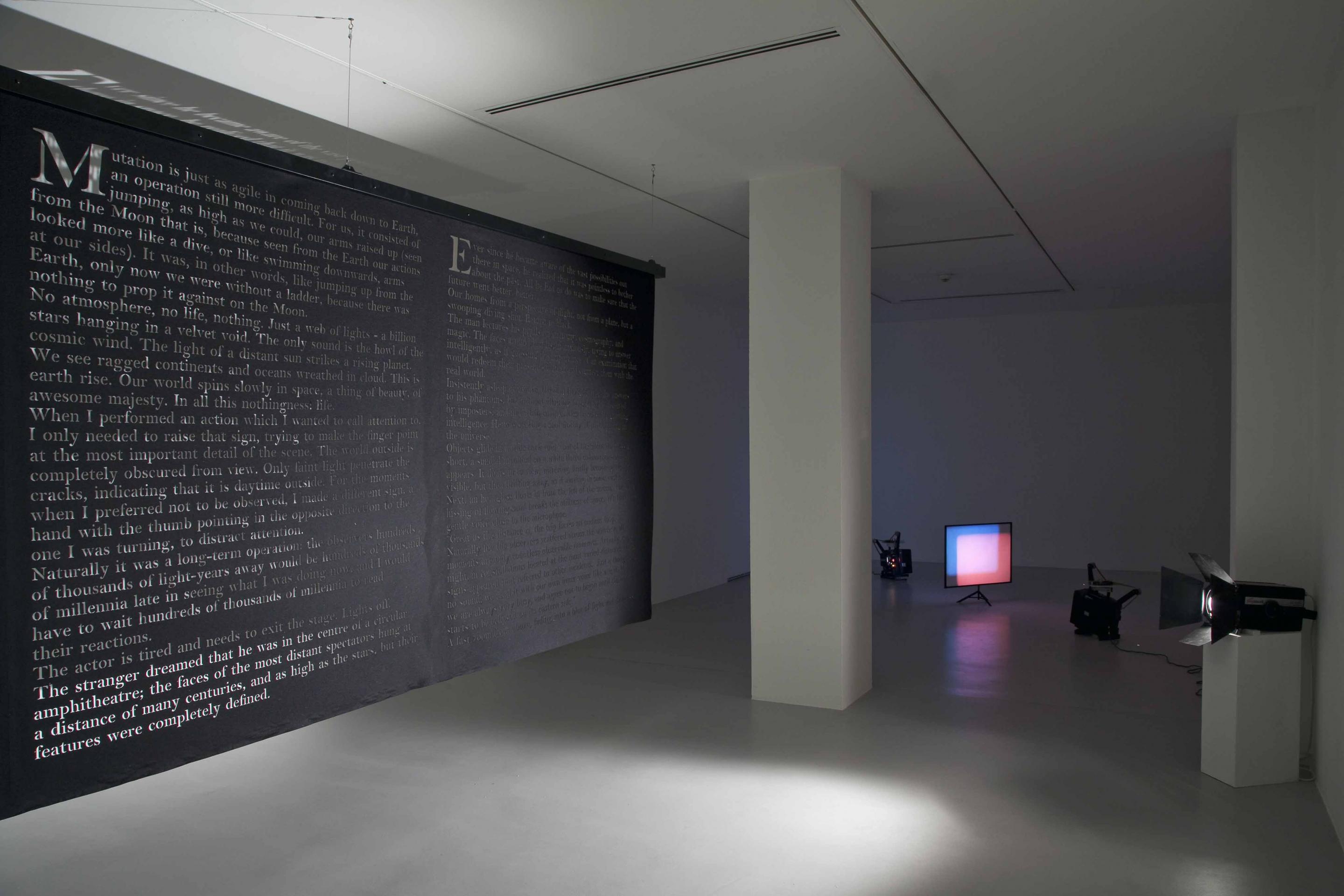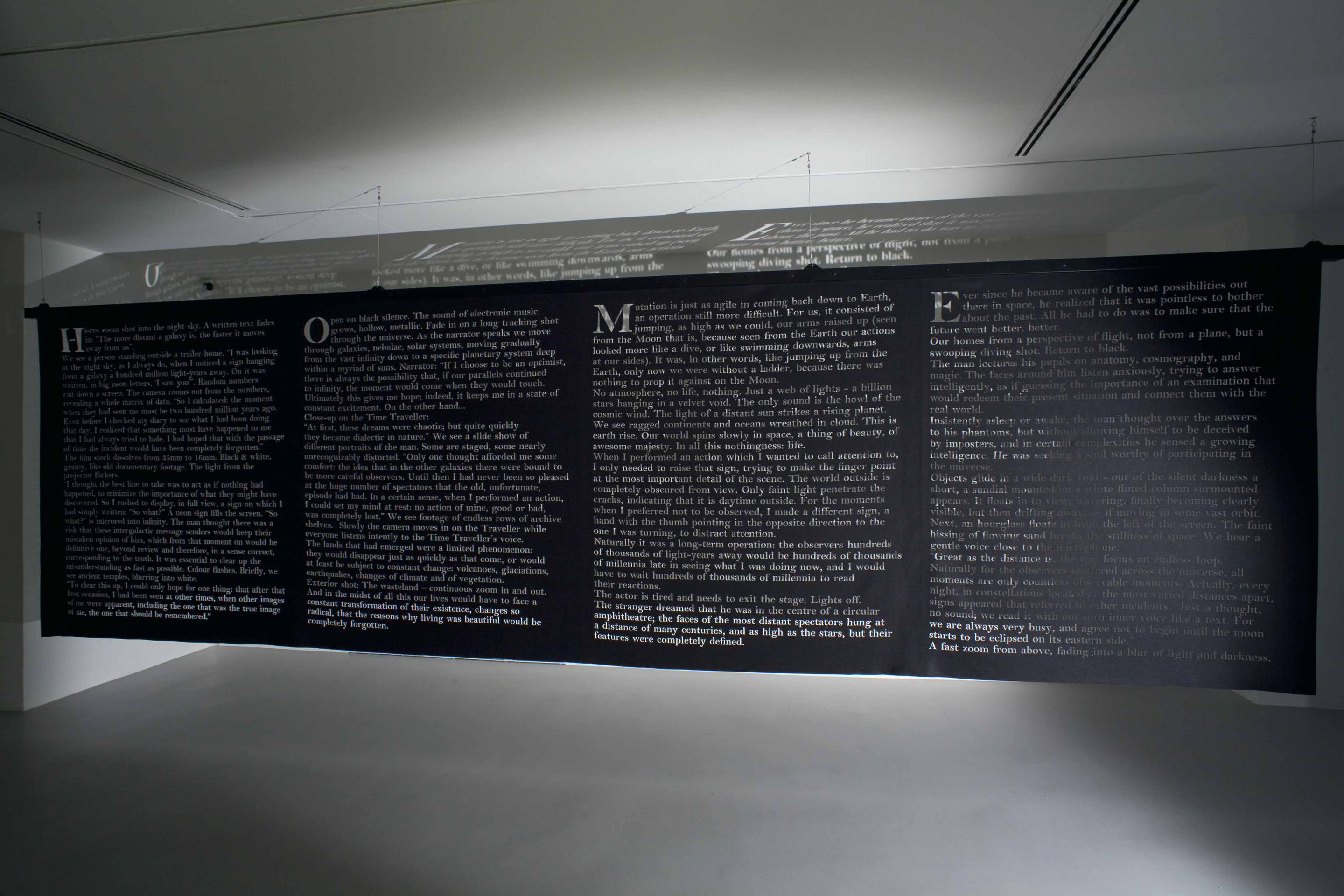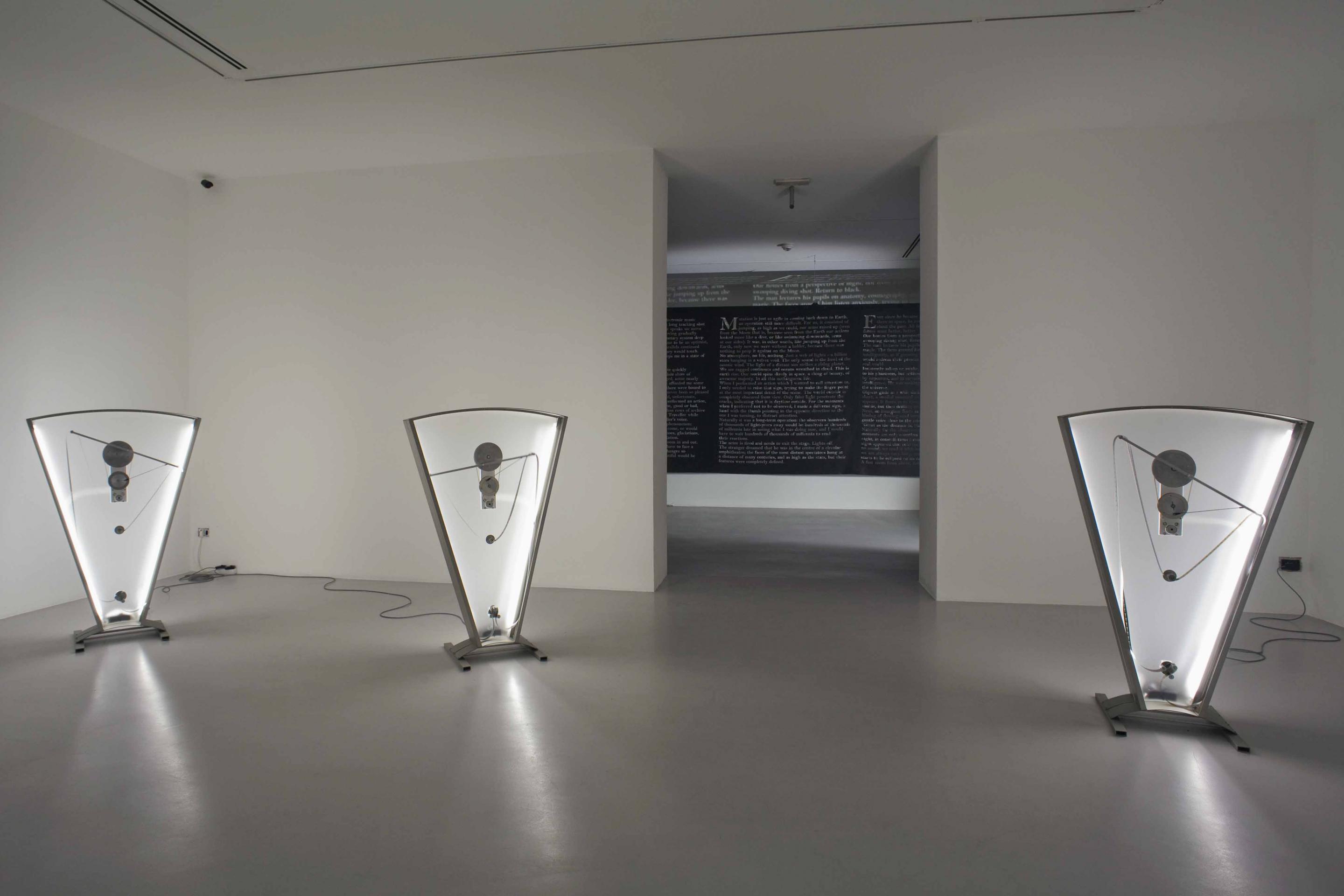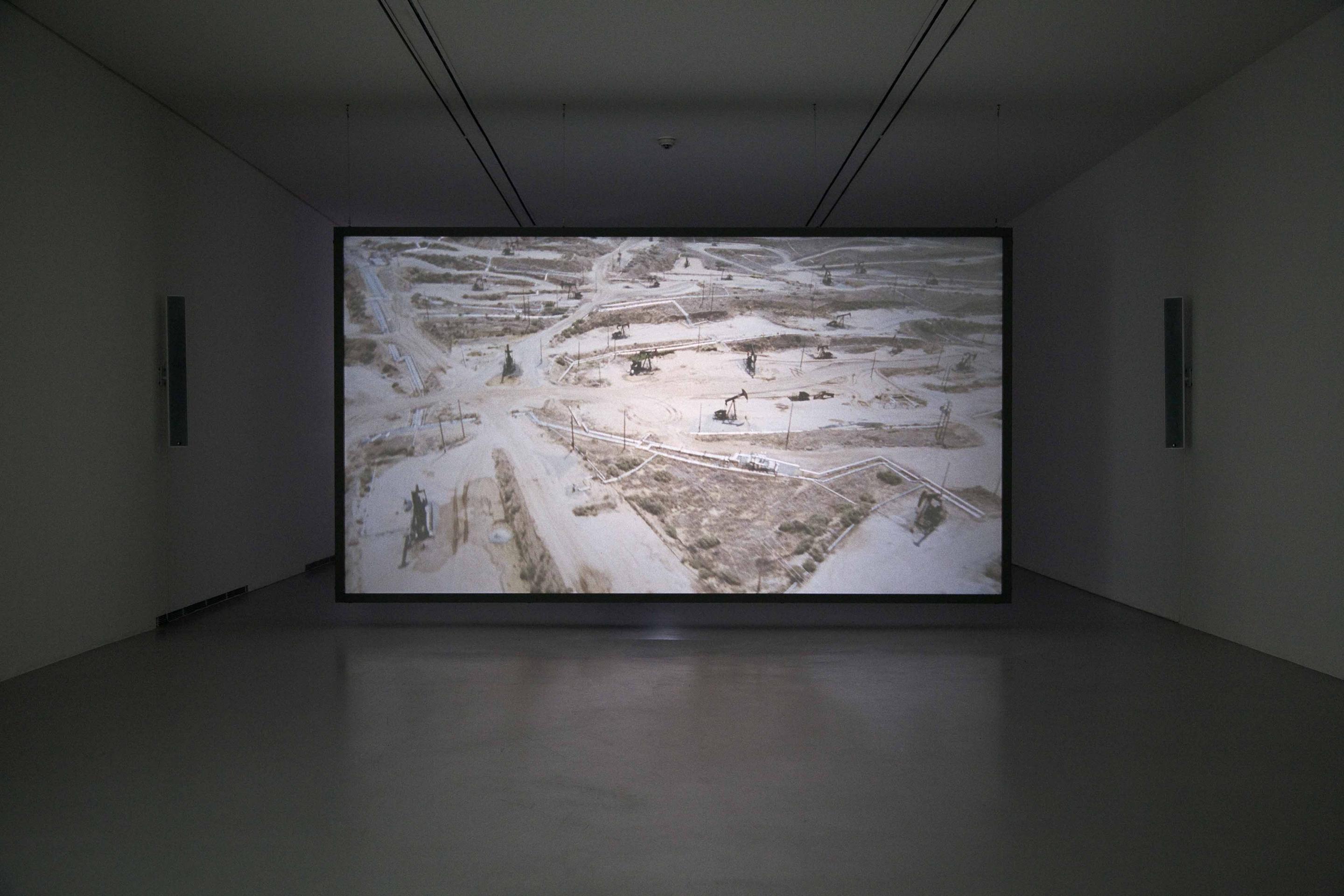RosaBARBA
The Mute Veracity of Matter
Gió Marconi, Milan
27.05.–19.07.2013
The Mute Veracity of Matter
Gió Marconi, Milan
27.05.–19.07.2013
IT
Rosa Barba
The Mute Veracity of Matter
Inaugurazione: lunedì 27 maggio 2013 dalle 19 alle 21
28 maggio - 19 luglio, 2013
martedì - sabato; 11-19
Giò Marconi ha il piacere di presentare The Mute Veracity of Matter, seconda mostra personale dell’artista italiana Rosa Barba.
Molti sono i temi della poetica di Barba, dalla riflessione sul concetto di tempo, come i segni che lascia nel paesaggio, a quella sul linguaggio, ai salti temporali attraverso la storia. Ma l’interesse principale dell’artista è quello di astrarre il medium cinematografico per analizzarne limiti e potenzialità.
Rosa Barba, come gli strutturalisti, indaga soprattutto gli aspetti intrinseci del film – i meccanismi di funzionamento del proiettore, la percezione nello spazio, la materialità del mezzo e come questa si esprima non soltanto a livello visivo, ma nel suono e nel tempo.
Per la mostra alla galleria Giò Marconi l’artista presenta il film in 35 mm Time as Perspective (2012), una grande scultura in feltro The Contemplative or The Speculative (2013), sculture cinetiche come Still Anchored in One Point from which They Emerge (2013), Footnotes (2013), Color Clocks: Verticals Lean Occasionally Consistently Away from Viewpoints (2012) e l’installazione Color Studies (2013).
Time as Perspective, è stato presentato per la prima volta nel 2012 in occasione della personale di Barba alla Kunsthaus Zürich organizzata in collaborazione con la Kunsthall Bergen dove la mostra, proposta qui come un ulteriore capitolo, si è appena conclusa (Marzo 2013). Il film è girato nel deserto del Texas e mostra gigantesche trivellatrici che ripetono tutte costantemente lo stesso movimento meccanico. Questo video, oltre a mettere in risalto le qualità poetiche e scultoree del paesaggio, tocca forti questioni sociali e politiche con i suoi riferimenti allo sfruttamento delle risorse naturali.
Rosa Barba è sempre stata affascinata dagli ambienti vasti e aridi e dal deserto in particolar modo, proprio per la dimensione senza tempo insita in questo luogo. La collocazione temporale di questo video non è chiara, le immagini che vediamo potrebbero essere avveniristiche visioni del futuro o documenti storici.
I film di Rosa Barba hanno a che fare con il concetto di tempo, inteso dall'artista non solo come movimento lineare e progressivo ma anche come qualcosa che si apre a livelli più profondi. Dice Rosa Barba: “gli intervalli di tempo impilati uno sopra l'altro in una sorta di ‘profondo tempo’ geologico sono alla base della mia riflessione sul mezzo filmico”. Così il film diventa una traccia della profondità del tempo, dove si può vedere o avvertire una struttura spaziale all'interno della storia, con tutti i suoi strati e le sue trasformazioni.
The Contemplative or The Speculative è un grande feltro nero, sospeso al soffitto e illuminato da un proiettore. Sul feltro è inciso un testo che il tessuto stesso rende illeggibile: le parole si distinguono chiaramente soltanto nella loro ombra sul muro. Dice l’artista: si crea così “una sala di lettura segreta”.
In Color Studies Rosa Barba utilizza i tre colori primari e li fa dialogare tra loro attraverso la condivisione dello stesso schermo di proiezione, dando vita ad infinite possibilità di colore.
Le tre sculture Color Clocks: Verticals Lean Occasionally Consistently Away from Viewpoints sono definite dall’artista come “dipinti cinetici”. Sono tre grandi strumenti meccanici dove pellicole 35 mm, sulle quali sono stampate delle lettere, si muovono in continuazione e ogni nastro riproduce in parola un colore, rosso, blu e giallo. Queste sculture ricordano il meccanismo interno di un orologio, con la differenza che non definiscono il tempo, ma anzi lo annullano in un loop senza fine. E’ una meditazione sul colore, sul tempo, sulla percezione e sul linguaggio, sul significato che assume una parola se ripetuta all’infinito.
Rosa Barba nasce ad Agrigento nel 1972 ma è cresciuta in Germania. Ha studiato all’Academy of Media Arts a Colonia, per poi completare la sua formazione con la residenza presso la Rijksakademie van Beeldende Kunsten di Amsterdam. Attualmente vive e lavora a Berlino.
Tra le sue personali: A Home for a Unique Individual, MUSAC, Museo de Arte Contemporaneo de Castilla y León, León; Time as Perspective, Bergen Kunsthall, Bergen (2013); Time as Perspective, Kunsthaus Zürich, Zürich; Back Door Exposure, Jeu de Paume, Paris; Museum of Contemporary Art, St. Louis, USA; Arter, Istanbul (2012); Stage Archive, Fondazione Galleria Civica - Center of Research on Contemporary Art, Trento; Stage Archive, MART Museo d’Arte Moderna e Contemporanea di Trento e Rovereto, Rovereto; Kunstverein, Braunschweig (2011); TATE Modern, London; Center of Contemporary Arts, Tel Aviv e Centre International d’Art & du Paysage, Vassivère (2010). Inoltre Rosa Barba ha partecipato a numerose mostre collettive, tra le più recenti: Ankäufe, Bundeskunstsammlung, Bonn (2013); Film and Sculpture, Wiels Brussels; Man in the Holocene, MIT List Visual Arts Center, Cambridge; Pink Caviar, Louisiana Museum of Modern Art, Humlebaek; Macro, Rome; A Trip to the Moon. Before and After Film, Bonniers Konsthall, Stockholm; Made in Germany 2, Sprengel Museum, Hannover; Collezione ACACIA, Palazzo Reale, Milan (2012); Making Worlds, Palazzo delle Esposizioni, 53nd Venice Biennale (2009); 52nd Venice Biennale, Slovenian Pavillon, 2007. Il suo lavoro è presente in numerose collezioni pubbliche, tra cui: Galleria civica d’arte moderna e contemporanea (GAM), Torino; Hamburger Bahnhof, Museum für Gegenwart, Berlin; Kunsthaus Zürich, Zürich; Louisiana Museum of Modern Art, Humlebaek; Mart - Museo d’Arte Moderna e Contemporanea di Trento e Rovereto, Rovereto; Museo Centro de Arte Reina Sofía, Madrid.
The Mute Veracity of Matter
Inaugurazione: lunedì 27 maggio 2013 dalle 19 alle 21
28 maggio - 19 luglio, 2013
martedì - sabato; 11-19
Giò Marconi ha il piacere di presentare The Mute Veracity of Matter, seconda mostra personale dell’artista italiana Rosa Barba.
Molti sono i temi della poetica di Barba, dalla riflessione sul concetto di tempo, come i segni che lascia nel paesaggio, a quella sul linguaggio, ai salti temporali attraverso la storia. Ma l’interesse principale dell’artista è quello di astrarre il medium cinematografico per analizzarne limiti e potenzialità.
Rosa Barba, come gli strutturalisti, indaga soprattutto gli aspetti intrinseci del film – i meccanismi di funzionamento del proiettore, la percezione nello spazio, la materialità del mezzo e come questa si esprima non soltanto a livello visivo, ma nel suono e nel tempo.
Per la mostra alla galleria Giò Marconi l’artista presenta il film in 35 mm Time as Perspective (2012), una grande scultura in feltro The Contemplative or The Speculative (2013), sculture cinetiche come Still Anchored in One Point from which They Emerge (2013), Footnotes (2013), Color Clocks: Verticals Lean Occasionally Consistently Away from Viewpoints (2012) e l’installazione Color Studies (2013).
Time as Perspective, è stato presentato per la prima volta nel 2012 in occasione della personale di Barba alla Kunsthaus Zürich organizzata in collaborazione con la Kunsthall Bergen dove la mostra, proposta qui come un ulteriore capitolo, si è appena conclusa (Marzo 2013). Il film è girato nel deserto del Texas e mostra gigantesche trivellatrici che ripetono tutte costantemente lo stesso movimento meccanico. Questo video, oltre a mettere in risalto le qualità poetiche e scultoree del paesaggio, tocca forti questioni sociali e politiche con i suoi riferimenti allo sfruttamento delle risorse naturali.
Rosa Barba è sempre stata affascinata dagli ambienti vasti e aridi e dal deserto in particolar modo, proprio per la dimensione senza tempo insita in questo luogo. La collocazione temporale di questo video non è chiara, le immagini che vediamo potrebbero essere avveniristiche visioni del futuro o documenti storici.
I film di Rosa Barba hanno a che fare con il concetto di tempo, inteso dall'artista non solo come movimento lineare e progressivo ma anche come qualcosa che si apre a livelli più profondi. Dice Rosa Barba: “gli intervalli di tempo impilati uno sopra l'altro in una sorta di ‘profondo tempo’ geologico sono alla base della mia riflessione sul mezzo filmico”. Così il film diventa una traccia della profondità del tempo, dove si può vedere o avvertire una struttura spaziale all'interno della storia, con tutti i suoi strati e le sue trasformazioni.
The Contemplative or The Speculative è un grande feltro nero, sospeso al soffitto e illuminato da un proiettore. Sul feltro è inciso un testo che il tessuto stesso rende illeggibile: le parole si distinguono chiaramente soltanto nella loro ombra sul muro. Dice l’artista: si crea così “una sala di lettura segreta”.
In Color Studies Rosa Barba utilizza i tre colori primari e li fa dialogare tra loro attraverso la condivisione dello stesso schermo di proiezione, dando vita ad infinite possibilità di colore.
Le tre sculture Color Clocks: Verticals Lean Occasionally Consistently Away from Viewpoints sono definite dall’artista come “dipinti cinetici”. Sono tre grandi strumenti meccanici dove pellicole 35 mm, sulle quali sono stampate delle lettere, si muovono in continuazione e ogni nastro riproduce in parola un colore, rosso, blu e giallo. Queste sculture ricordano il meccanismo interno di un orologio, con la differenza che non definiscono il tempo, ma anzi lo annullano in un loop senza fine. E’ una meditazione sul colore, sul tempo, sulla percezione e sul linguaggio, sul significato che assume una parola se ripetuta all’infinito.
Rosa Barba nasce ad Agrigento nel 1972 ma è cresciuta in Germania. Ha studiato all’Academy of Media Arts a Colonia, per poi completare la sua formazione con la residenza presso la Rijksakademie van Beeldende Kunsten di Amsterdam. Attualmente vive e lavora a Berlino.
Tra le sue personali: A Home for a Unique Individual, MUSAC, Museo de Arte Contemporaneo de Castilla y León, León; Time as Perspective, Bergen Kunsthall, Bergen (2013); Time as Perspective, Kunsthaus Zürich, Zürich; Back Door Exposure, Jeu de Paume, Paris; Museum of Contemporary Art, St. Louis, USA; Arter, Istanbul (2012); Stage Archive, Fondazione Galleria Civica - Center of Research on Contemporary Art, Trento; Stage Archive, MART Museo d’Arte Moderna e Contemporanea di Trento e Rovereto, Rovereto; Kunstverein, Braunschweig (2011); TATE Modern, London; Center of Contemporary Arts, Tel Aviv e Centre International d’Art & du Paysage, Vassivère (2010). Inoltre Rosa Barba ha partecipato a numerose mostre collettive, tra le più recenti: Ankäufe, Bundeskunstsammlung, Bonn (2013); Film and Sculpture, Wiels Brussels; Man in the Holocene, MIT List Visual Arts Center, Cambridge; Pink Caviar, Louisiana Museum of Modern Art, Humlebaek; Macro, Rome; A Trip to the Moon. Before and After Film, Bonniers Konsthall, Stockholm; Made in Germany 2, Sprengel Museum, Hannover; Collezione ACACIA, Palazzo Reale, Milan (2012); Making Worlds, Palazzo delle Esposizioni, 53nd Venice Biennale (2009); 52nd Venice Biennale, Slovenian Pavillon, 2007. Il suo lavoro è presente in numerose collezioni pubbliche, tra cui: Galleria civica d’arte moderna e contemporanea (GAM), Torino; Hamburger Bahnhof, Museum für Gegenwart, Berlin; Kunsthaus Zürich, Zürich; Louisiana Museum of Modern Art, Humlebaek; Mart - Museo d’Arte Moderna e Contemporanea di Trento e Rovereto, Rovereto; Museo Centro de Arte Reina Sofía, Madrid.
EN
Rosa Barba
The Mute Veracity of Matter
Opening: Monday, May 27, 2013; 11am-7pm
May 28 - July 19, 2013
Tuesday - Saturday; 11am-7pm
Giò Marconi is very pleased to present The Mute Veracity of Matter, the second solo exhibition of Italian artist Rosa Barba.
Her work engages questions of time like inscriptions in landscapes and language and cuts across history and subject matter. Rosa Barba is especially interested in abstracting the cinematographic medium to push limits and possibilities.
Like the structuralists, she is preoccupied by the immanent aspects of film – the workings of projectors, perception in space, the materiality of the medium as expressed not just optically but in sound and in time.
At Giò Marconi, the artist presents the 35 mm film Time as Perspective (2012), a big felt sculpture The Contemplative or the Speculative (2013), kinetic sculptures like Still Anchored in One Point from which They Emerge (2013), Footnotes (2013), Color Clocks: Verticals Lean Occasionally Consistently Away from Viewpoints (2012) and the installation Color Studies (2013).
Time as Perspective was launched at the Kunsthaus Zurich for Rosa Barba’s solo exhibition in 2012 and was co-commissioned by the Kunsthall Bergen where the show was on recently (till March 2013) in a modified and slightly extended version.
The film was shot in the Texan desert and shows huge oil pumps constantly repeating the same mechanical movement. Beside its meditative sculptural quality in the landscape, it touches on strong social and political issues with its references to exploitation of natural resources.
Rosa Barba has always been fascinated by vast and arid landscapes, particularly the desert for its seemingly endless perspective. The point of time in Time as Perspective is unclear and it could therefore be a futuristic vision or an historical document.
Rosa Barba’s films deal with the aspect of time, not only as a progressive linear motion but also as something that unfolds in layers of depth. In the artist’s words: “Time intervals stacked one over another in a kind of geological ‘deep time’ form the basis for much of my thinking about the film medium.” As such, the film becomes an imprint of the depth of time, where one can see or sense a spatial structure inward into the story, with all its strata and transformations.
The Contemplative or the Speculative is a large black felt tapestry, suspended from the ceiling and illuminated by a projector. The text is punched into the felt but the tapestry’s materiality negates its legibility: the words can only be read clearly on the wall behind. In the artist’s words “a secret reading room” is created.
In Color Studies the artist brings the three primary colors into a productive dialogue by sharing the same projection screen and therefore creating infinite possibilities of colors.
The three sculptures Color Clocks: Verticals Lean Occasionally Consistently Away from Viewpoints are considered “kinetic paintings” by the artist. They are three triangular mechanical instruments inside which a 35mm celluloid strip with printed text is constantly moving. Each of the three film strips reproduces a color with the word red, blue or yellow. These sculptures are reminiscent of the internal mechanism of a clock but they are different in the sense that they do not define time but reverse it in an endless loop. It’s a meditation on color, time, perception and language, on the meaning of a word when repeated infinitively.
Rosa Barba was born in Agrigento in 1972 and grew up in Germany where she studied at the Academy of Media Arts in Cologne followed by a residency at the Rijksakademie van Beeldende Kunsten in Amsterdam.
She currently lives and works in Berlin.
Recent solo exhibitions include: A Home for a Unique Individual, MUSAC, Museo de Arte Contemporaneo de Castilla y León, León; Time as Perspective, Bergen Kunsthall, Bergen (2013); Time as Perspective, Kunsthaus Zurich, Zurich; Back Door Exposure, Jeu de Paume, Paris; Museum of Contemporary Art, St. Louis; Arter, Istanbul (2012); Stage Archive, Fondazione Galleria Civica - Center of Research on Contemporary Art, Trento; Stage Archive, MART Museo d’Arte Moderna e Contemporanea di Trento e Rovereto, Rovereto; Kunstverein, Braunschweig (2011); TATE Modern, London; Center of Contemporary Arts, Tel Aviv; Centre International d’Art & du Paysage, Vassivère (2010). Rosa Barba’s work has been featured in numerous group shows: Ankäufe, Bundeskunstsammlung, Bonn (2013); Film and Sculpture, Wiels Brussels; Man in the Holocene, MIT List Visual Arts Center, Cambridge; Pink Caviar, Louisiana Museum of Modern Art, Humlebaek; Macro, Rome; A Trip to the Moon. Before and After Film, Bonniers Konsthall, Stockholm; Made in Germany 2, Sprengel Museum, Hannover; Collezione ACACIA, Palazzo Reale, Milan (2012); Making Worlds, Palazzo delle Esposizioni, 53rd Venice Biennial (2009); 52nd Venice Biennial, Slovenian Pavillon, (2007). She is represented in important public collections, amongst them: Galleria civica d’arte moderna e contemporanea (GAM), Torino; Hamburger Bahnhof, Museum für Gegenwart, Berlin; Kunsthaus Zurich, Zurich; Louisiana Museum of Modern Art, Humlebaek; Mart - Museo d’Arte Moderna e Contemporanea di Trento e Rovereto, Rovereto; Museo Centro de Arte Reina Sofía, Madrid.
The Mute Veracity of Matter
Opening: Monday, May 27, 2013; 11am-7pm
May 28 - July 19, 2013
Tuesday - Saturday; 11am-7pm
Giò Marconi is very pleased to present The Mute Veracity of Matter, the second solo exhibition of Italian artist Rosa Barba.
Her work engages questions of time like inscriptions in landscapes and language and cuts across history and subject matter. Rosa Barba is especially interested in abstracting the cinematographic medium to push limits and possibilities.
Like the structuralists, she is preoccupied by the immanent aspects of film – the workings of projectors, perception in space, the materiality of the medium as expressed not just optically but in sound and in time.
At Giò Marconi, the artist presents the 35 mm film Time as Perspective (2012), a big felt sculpture The Contemplative or the Speculative (2013), kinetic sculptures like Still Anchored in One Point from which They Emerge (2013), Footnotes (2013), Color Clocks: Verticals Lean Occasionally Consistently Away from Viewpoints (2012) and the installation Color Studies (2013).
Time as Perspective was launched at the Kunsthaus Zurich for Rosa Barba’s solo exhibition in 2012 and was co-commissioned by the Kunsthall Bergen where the show was on recently (till March 2013) in a modified and slightly extended version.
The film was shot in the Texan desert and shows huge oil pumps constantly repeating the same mechanical movement. Beside its meditative sculptural quality in the landscape, it touches on strong social and political issues with its references to exploitation of natural resources.
Rosa Barba has always been fascinated by vast and arid landscapes, particularly the desert for its seemingly endless perspective. The point of time in Time as Perspective is unclear and it could therefore be a futuristic vision or an historical document.
Rosa Barba’s films deal with the aspect of time, not only as a progressive linear motion but also as something that unfolds in layers of depth. In the artist’s words: “Time intervals stacked one over another in a kind of geological ‘deep time’ form the basis for much of my thinking about the film medium.” As such, the film becomes an imprint of the depth of time, where one can see or sense a spatial structure inward into the story, with all its strata and transformations.
The Contemplative or the Speculative is a large black felt tapestry, suspended from the ceiling and illuminated by a projector. The text is punched into the felt but the tapestry’s materiality negates its legibility: the words can only be read clearly on the wall behind. In the artist’s words “a secret reading room” is created.
In Color Studies the artist brings the three primary colors into a productive dialogue by sharing the same projection screen and therefore creating infinite possibilities of colors.
The three sculptures Color Clocks: Verticals Lean Occasionally Consistently Away from Viewpoints are considered “kinetic paintings” by the artist. They are three triangular mechanical instruments inside which a 35mm celluloid strip with printed text is constantly moving. Each of the three film strips reproduces a color with the word red, blue or yellow. These sculptures are reminiscent of the internal mechanism of a clock but they are different in the sense that they do not define time but reverse it in an endless loop. It’s a meditation on color, time, perception and language, on the meaning of a word when repeated infinitively.
Rosa Barba was born in Agrigento in 1972 and grew up in Germany where she studied at the Academy of Media Arts in Cologne followed by a residency at the Rijksakademie van Beeldende Kunsten in Amsterdam.
She currently lives and works in Berlin.
Recent solo exhibitions include: A Home for a Unique Individual, MUSAC, Museo de Arte Contemporaneo de Castilla y León, León; Time as Perspective, Bergen Kunsthall, Bergen (2013); Time as Perspective, Kunsthaus Zurich, Zurich; Back Door Exposure, Jeu de Paume, Paris; Museum of Contemporary Art, St. Louis; Arter, Istanbul (2012); Stage Archive, Fondazione Galleria Civica - Center of Research on Contemporary Art, Trento; Stage Archive, MART Museo d’Arte Moderna e Contemporanea di Trento e Rovereto, Rovereto; Kunstverein, Braunschweig (2011); TATE Modern, London; Center of Contemporary Arts, Tel Aviv; Centre International d’Art & du Paysage, Vassivère (2010). Rosa Barba’s work has been featured in numerous group shows: Ankäufe, Bundeskunstsammlung, Bonn (2013); Film and Sculpture, Wiels Brussels; Man in the Holocene, MIT List Visual Arts Center, Cambridge; Pink Caviar, Louisiana Museum of Modern Art, Humlebaek; Macro, Rome; A Trip to the Moon. Before and After Film, Bonniers Konsthall, Stockholm; Made in Germany 2, Sprengel Museum, Hannover; Collezione ACACIA, Palazzo Reale, Milan (2012); Making Worlds, Palazzo delle Esposizioni, 53rd Venice Biennial (2009); 52nd Venice Biennial, Slovenian Pavillon, (2007). She is represented in important public collections, amongst them: Galleria civica d’arte moderna e contemporanea (GAM), Torino; Hamburger Bahnhof, Museum für Gegenwart, Berlin; Kunsthaus Zurich, Zurich; Louisiana Museum of Modern Art, Humlebaek; Mart - Museo d’Arte Moderna e Contemporanea di Trento e Rovereto, Rovereto; Museo Centro de Arte Reina Sofía, Madrid.
